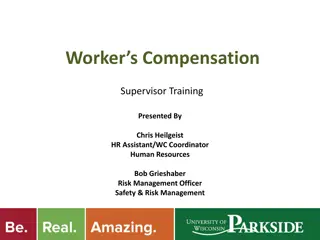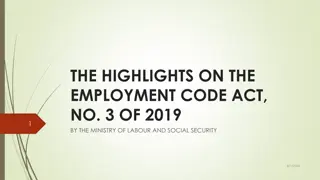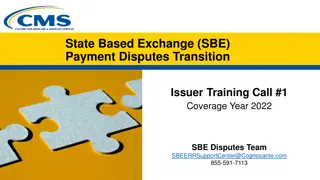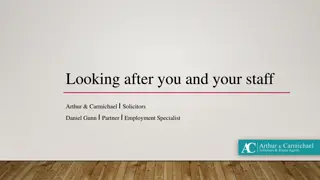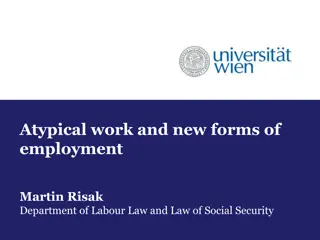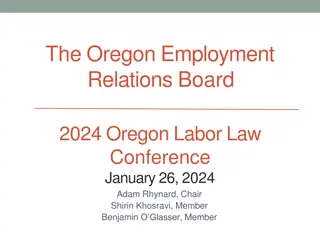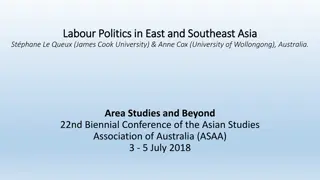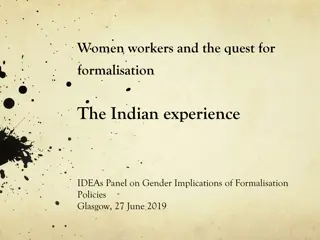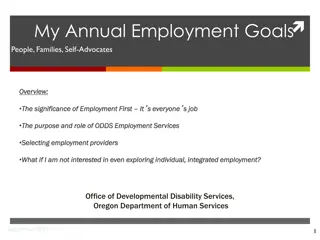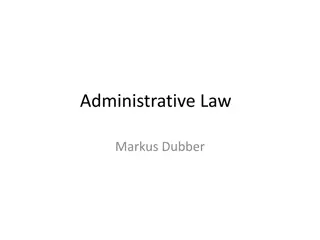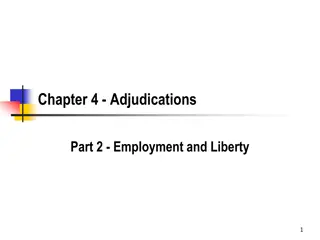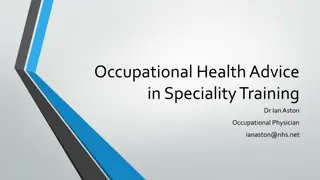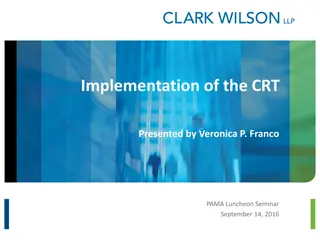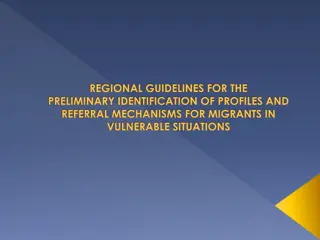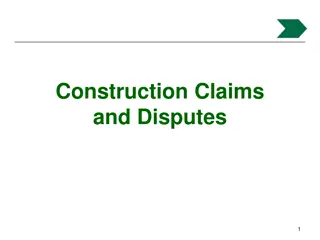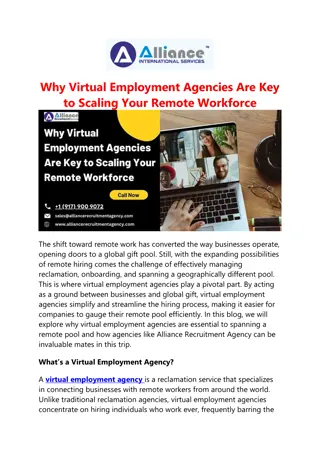Vulnerable workers and employment disputes: the role of advice agencies
This research presentation explores the legal consciousness and experiences of vulnerable workers in navigating employment disputes, focusing on the changing legislative environment, challenges faced by advice agencies, and barriers to justice. It highlights the impact of employment tribunals, qualitative investigations, and the role of Citizens Advice Bureaux in supporting vulnerable workers. The content delves into the complexities of unfair dismissal claims, fees regime implications, and the need to amplify the voices of those at risk of employment rights denial.
Download Presentation

Please find below an Image/Link to download the presentation.
The content on the website is provided AS IS for your information and personal use only. It may not be sold, licensed, or shared on other websites without obtaining consent from the author.If you encounter any issues during the download, it is possible that the publisher has removed the file from their server.
You are allowed to download the files provided on this website for personal or commercial use, subject to the condition that they are used lawfully. All files are the property of their respective owners.
The content on the website is provided AS IS for your information and personal use only. It may not be sold, licensed, or shared on other websites without obtaining consent from the author.
E N D
Presentation Transcript
Vulnerable workers and employment disputes: the role of advice agencies Dr Morag McDermont Prof Nicole Busby Dr Emily Rose Mr Adam Sales
Outline of presentation Background to research Legal consciousness and researching vulnerable workers Employment tribunals under attack The changing legislative environment The pilot study: Barriers to Justice Advice Agencies: New Sites of Legal Consciousness Citizens Advice Bureaux and Employment Disputes Questions
Legal consciousness and researching vulnerable workers Inadequacies of quantitative surveys Vulnerable worker someone working in an environment where the risk of being denied employment rights is high and who does not have the capacity or means to protect themselves from that abuse. ( Success at Work: Protecting Vulnerable Workers, Supporting Good Employers: A Policy Statement for this Parliament (DTI 2006, at [25])) Giving voice to vulnerable workers Legal consciousness Rejects a law first enquiry Law in everyday life In-depth qualitative investigation
Employment tribunals under attack Vince Cable called for radical reform to the employment law system far too costly, time-consuming, and complex for employers too easy [for employees] to make unmerited claims
ETs: the changing legislative environment Increase to the qualifying period for unfair dismissal From 6 April 2012, the qualifying period for right to claim unfair dismissal rose to 2 years from 1 year Vulnerable workers particularly likely to be affected as a greater proportion of CAB clients with employment problems have been employed for more than one year but less than two years (15%) compared with the broader population (10%) (Dunstan and Anderson, 2008) Impending introduction of fees regime for ETs 160 issue fee and 230 hearing fee for level 1 claims; 250 issue fee and 950 hearing fee for level 2 claims; 400 EAT appeal fee and 1,200 EAT hearing fee, due to be implemented summer 2013
Pilot: Barriers to Justice Citizens Advice Bureaux First destination for advice on employment disputes Key site for the shaping of vulnerable workers legal consciousness Pilot study Funded by SLS and Bristol School of Law 10 interviews with CAB clients who submitted ET1 form Intended to lead to case tracking study
Findings ET process overly formal and technical CAB acted as translators of language and procedures into formulations vulnerable workers could understand Power inequalities: case management phone call [judge was] 100%, probably 110%, behind me, which was, that was the only time I felt, wow. . . someone believes what I m saying. . . . if it did go to court, I think I would a had his support, because he was actually telling the other guys that he thought it was pathetic. (Interviewee 1) . . .she would say, Yes, sir, or Yes, something, . . . . You know like they ve got to use, they talk a certain way, and they use certain words and stuff. Of course, I just felt like, oh my God, I m going to lose this case! (Interviewee 2)
Findings continued Legal representation at the ET considered necessary: Someone told me I could come and represent myself, but . . . I said myself, it looks stupid if I go and represent myself. And uh, the company got, got this solicitor, and I d be tied into knots. So therefore, I thought no . . I ll just cancel the whole thing . . . (Interviewee 9) Acas : site of ADR Reframing of cases from rights to needs problematic Tenet of impartiality was disempowering Pragmatic rationalities of managerialism Prioritised positive clearance rates, swift resolution Often felt like bullying to unrepresented workers
Advice Agencies: New Sites of Legal Consciousness Citizens Advice Bureaux and Employment Disputes ERC Starting Independent Investigator grant New Sites of Legal Consciousness Case-tracking research project Impact of legislative changes How will changes in employment law impact on vulnerable workers behaviour? Mixed methods research Survey before and after ET fees
Research aims Understand the role played by CAB advisors Observe meetings between CAB advisors and clients Observe and talk with CAB staff and volunteers Capture implications of the varying levels of assistance and resources offered by bureaux Pro-bono solicitors Specialist legal advisers Local authority-funded solicitor (Scotland) Map interaction with Acas, ET judges, other legal players Participants complete diary of their thoughts and experiences throughout the dispute resolution process Observe key events in the case, including interaction with Acas and ET judges
Building on the pilot study Explore range of strategies taken by workers Expand sample group beyond those who choose to take cases to ET Exploring legal consciousness Social relations and sites of cultural production Understanding power relations Life history interviews: social, cultural and economic capital matters Following participants resolving employment disputes
Questions What is the role of legal expertise? How will ET changes impact on vulnerable workers? What about Acas and ET judges? What else should we be attempting to capture?
References Aston, J. et al (2006), The Experience of Claimants in Race Discrimination Employment Tribunal Cases, DTI Employment Relations Research series no 55. Denvir, A. et al (2007), The Experiences of Sexual Orientation and Religion or Belief Discrimination Employment Tribunal Claimants (Ref: 02/07) Acas. Dunstan, R. and Anderson, D. (2008) Vulnerable Workers: Preliminary Findings from the Citizens Advice Client Research, Employment Relations Occasional Paper, BERR. Palmer, A. (2012), Opinion: Unfair Dismissal Claims, The Lawyer (11 September) (http://www.thelawyer.com/opinion-unfair-dismissal- claims/1009642.article), accessed 11 September 2012. Peters, M. et al (2006), Findings from the Survey of Claimants in Race Discrimination Employment Tribunal Cases, DTI Employment Relations Research series no 54. Renton, D. (2012) The Coalition s Reforms to the Tribunal System will Impair Justice, New Law Journal (27 April).






